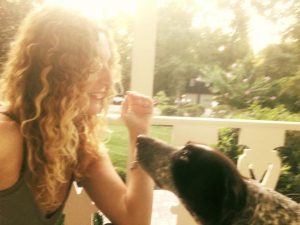16 Sep On Friday, Human Sentimentality and Animal Freedom
My Girl Friday
April 1, 2009 – September 16, 2021
 Amongst the concepts that mark what we have in common the concept of mortality is preeminent…Clearly, dogs have no such understanding. If they have a practical awareness of death, they have no reflective awareness of mortality…But because of the attenuated individuality that [she] shares with some other animals, I have with her a bond that is deepened by my sorrowful recognition that we are both mortal creatures. —Raimond Gaita
Amongst the concepts that mark what we have in common the concept of mortality is preeminent…Clearly, dogs have no such understanding. If they have a practical awareness of death, they have no reflective awareness of mortality…But because of the attenuated individuality that [she] shares with some other animals, I have with her a bond that is deepened by my sorrowful recognition that we are both mortal creatures. —Raimond Gaita
I think we should accept the fact that a doggie culture seems to be part of every ski town in America: Winter Park, Steamboat, Sun Valley—the dogs are one of the ways we show the visitors we are free. —Pam Houston
A dog was called by that name, and nothing remains. But I will tell you a true thing right at the beginning: There never was a dog like Algonquin. —Dion Henderson
Some dogs, even quite old ones, seem as if they will live forever, their existence somehow untethered to any human world or even a natural one. Friday was just this sort of creature. I can honestly and incredibility (as in, against every bit of plausibility and rationality I hold dear) say: I thought my girl Friday would live forever.
We sometimes say this about people after they pass (“she seemed like she would always be here, forever young and beautiful,” we said of my young aunt, who was, indeed, quite young and beautiful at the time of her passing) but we don’t really mean it. As humans, we live with a deep sense of our mortality, of the fragility of existence itself. It is, as Raimond Gaita says, one of the fundamental concepts that mark what we, as people, have in common, and “it conveys more than the fact that we will all die. It speaks of that fate in accents of sorrow and pity. It is the uniqueness and preciousness of each human being that gives to our dying the significance, the sorrowful resonance, that the Greeks captured when they called human beings The Mortals.”1 And because even the least reflective among us grapple with an end they know they will meet when their time is up, we understand this feature of others’ lives, too, on a very deep level and it draws us nearer to one another. The ties of human and moral life are strengthened by this knowing—not that we will pass, but the shared knowledge that we will, and the even deeper, uniquely human understanding of the weight and sorrow in it.
Not so with Friday. She was more out of this world than she was of it, and what made her seem so was not that she was particularly well-behaved—she certainly was, at one time anyway; or loving—she certainly had a fondness for our family, and for me, in particular (she was, after all, my daimon, it was said countless times), but she was never so desperate for our affection as to degrade herself; or beautiful—she was lovely to look at, especially in full stride giving chase to a bird, but I’ve seen far more exquisite pointers; or gifted—she was the best damn trail dog any runner could ask for, but she possessed no particular skill or talent that might be of service or worthy of some prize. Part of Friday’s other-worldliness had much to do with the fact that we interacted so complexly with her despite the fact that the humans who loved and cared for her are so wildly different a species from her. And this is true of all dogs loved and kept by people and families. Indeed, although she would lie at my feet for hours while I wrote, or go for quiet walks along the river with us, or eat her food at the same time as and in close proximity to the family, or would lick our daughter Kate’s tears from her face after we had scolded the poor child for one thing or another, she nevertheless would kill a rabbit before you could blink, sniff another dog’s urine as she pleased, or, worse, roll around in the feces of some other creature on occasion, or stare blankly into space, without so much as a tiny thought in her head. These moments would always remind me of her otherness, how set apart she was from so much of what marks us out as human. And Gaita points out, of course, that humans kill too, but what makes it so startling in non-human animals is something of the absence of a psychological dimension to it. In any case, surely part of what made my inability to reckon with her eventual passing possible must have had to do with the fact that, as much as she participated in our ethical shared life, she also existed largely outside of it.
 But, without doubt, what really gave her an air of immortality was a kind of excellence that she possessed, one that preceded and laid far beyond human expectations of her. She was, especially in her younger years, so truly fine a dog, and that fineness was perhaps related to but I want to say largely independent of the discipline I had given her so that she could participate in our shared ethical life (i.e. go to work with me, be off-lead, run hundreds of miles by my side with elk and wild animals taunting her at every turn, not have to do tricks to earn food but rather simply wait patiently until mealtime like the rest of us, lay on the floor with my babies, never be crated, and so on and so forth). The excellence she possessed, which I have called fineness, but which might also be called virtue, what the Greeks would call arete, was accompanied by a total indifference to our impressions or expectations of her. If she was to turn out to be mortal, like the rest of us, it would be her business, not ours.
But, without doubt, what really gave her an air of immortality was a kind of excellence that she possessed, one that preceded and laid far beyond human expectations of her. She was, especially in her younger years, so truly fine a dog, and that fineness was perhaps related to but I want to say largely independent of the discipline I had given her so that she could participate in our shared ethical life (i.e. go to work with me, be off-lead, run hundreds of miles by my side with elk and wild animals taunting her at every turn, not have to do tricks to earn food but rather simply wait patiently until mealtime like the rest of us, lay on the floor with my babies, never be crated, and so on and so forth). The excellence she possessed, which I have called fineness, but which might also be called virtue, what the Greeks would call arete, was accompanied by a total indifference to our impressions or expectations of her. If she was to turn out to be mortal, like the rest of us, it would be her business, not ours.
In her passing, many good people have reached out to offer their condolences. I am grateful for each one. Of course, some are easier to receive than others; some reflect the kind of quiet knowing that is appropriate at a time and occasion such as this. It is a special bond, and so a difficult blow. Not merely my “pooch” (I confess: I cringe to read words like that just now) but not quite a member of the family either. Losing a dog, no matter how loved or invincible she seemed, is not the same as the loss of one’s child, not even in the same orb, so to speak. And I do not need to lose my child to know that, but rather to simply know something of the deep and abiding bonds that are possible with certain dog companions and also to know something of the chasm that lies between us and them, why we do not, why we cannot, count them as full members of our human family either.
To resist that tendency towards something like sentimentality in death, wherein we light candles for dogs, give them funerals and bury them with their favorite toys (Friday, of course, never played with toys, for it seemed somehow beneath her) and the like, in the manner we do for fellow humans, is to uphold a realm of meaning that makes it possible for us to give to dogs the sort of dignity that is appropriate and fitting for them and so for us. If I were to say to you that Friday meant more to me than the whole world (and, on some days, she most certainly did), you would grant me the benefit of the doubt and not take me literally; you would assume that I was simply overcome with grief, and though I loved her very much and held her so dear, you would not take her to be more loved by me than, say, my own mother. For if that were true, our friendship might give you pause. To do anything more or other than grieve quietly together, circle the family wagon and draw everyone in close, spread her ashes in those places she loved best, and so honoring her and giving her the kind of dignity of which she is deserving in her death, would be expressive of a misunderstanding of her mystery, her attenuated attachment and individuality, her other-worldliness. It would also be expressive of a mawkishness and sentimentality that, I admit, I have spent the better part of my adulthood trying to stave off.
One of the ways we rightly love and honor our dog companions is by keeping in full view not just what we share with them, but what we don’t. How much of their existence is a mystery to us, and in ways that even the most different human on earth just isn’t. I want to cry and scream, and also I want to stay in full possession of my own ability to think and feel rightly about her sudden passing, this loss that is all-consuming. It is how I stay alright, thinking and writing clearly.
Still, as I type this, tears stream down my face. I do not understand what has happened. What it is to lose her. Not really, anyway. She was with me in almost every move I made, the many days of labor with Olive; the night we brought JoJo home from the hospital that time his finger was severed and we stayed up all night; the countless miles Out There; just yesterday, she slept in my lap while I read.
When Friday was younger and we lived in Chapel Hill, North Carolina, we would run in a little forest there near the university called Carolina North. She was a regular fixture there, and ran with me and many of our runner friends for many years. Always off-leash, as was fitting for a dog so well-disciplined, athletic, and fine. And the dear forest manager, Greg, would often catch us in the act, disheartened to find Friday, once again, unleashed, free as can be, in flagrant violation of the law. He was a good soul, but a public servant can likely only take being disrespected (and in front of so many and so wild a pack as was our running crew back then) so many times before they lose it. And when he would come upon us, wending our way through the trails, Friday would catch a whiff of him and she would take off like a shot. Poor Greg would become red with anger, shake his finger at Friday and me, and shout, “Friday! If I catch you one more time, so help me, I am taking you straight to the pound, I don’t care!” And, of course, no one really believed him, either that he would one day catch her or take her to the pound. She was always long gone and out of ear shot to pay him any mind. And I would always just scoot on by, flash a smile and a feigned frustrated eye-roll. “Greg!” I would say, “I cannot believe that dog left the house again like that! I swear, I cannot get her to put on her leash for anything in the world! Sorry!” I like to think that Friday delighted in evading The Law, but what was far more likely is that she was simply indifferent to it in that way that only a creature who cannot truly know remorse or shame can be. And how beautiful that struck me at the time. She was a Roussean dog, of sorts, born free, never willing to put on the chains of domestication entirely, but neither was she entirely wild either. She was both civilized and completely at liberty, in the very best of ways.
I have come to believe that we form some of our most fundamental concepts of what it means to be fully human in and through our relationships with non-human animals, specifically dog companions. And in my time with Friday, I have learned a great deal about these: friendship, freedom, and love.
It has been my honor to know and care for her these last twelve years. I have failed her countless times, and knowing something of my failures, she loved me still.
Friday. A dog was called by that name, and nothing else remains. But I will tell you a true thing right at the beginning: There was never a dog like Friday.
1. [Gaita, Raimond, The Philosopher’s Dog. Routledge, New York, 2002. p. 82]↩

